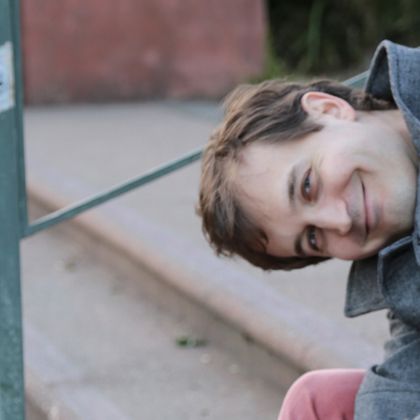Review: George Benjamin's Duet with the San Francisco Symphony
Rating: 3.5 stars out of 5
George Benjamin was the San Francisco Symphony’s composer-in-residence this month for this year’s installation of their Project San Francisco. Truthfully, I was not familiar with Benjamin’s work, but it came highly recommended by many of my colleagues, and so I looked forward to hearing it. I attended the SFS’s final concert with Benjamin on Saturday night (16 Jan 2010), where he conducted two of his pieces: Ringed by the Flat Horizon (1980), the piece that brought him to international attention, and a more recent piece, Duet (2008; see YouTube video below). In general, while I found Benjamin’s pieces highly competent works, I don’t think he lives up to the (perhaps unfairly) high standard people attribute to him. I also wonder if his music hasn’t suffered somewhat from his early career successes, as there is a palpable air of obsessive–compulsive disorder in his approach to composition, which doesn’t seem to have changed much in the last 30 years, if the two pieces on the program are representative.
First, it’s worth noting Benjamin’s impressive pedigree, not only having studied with Olivier Messaien as a teenager, but securing both the honour of being his youngest ever student and the one he called his favourite. According to critic Thomas May, Messiaen felt Benjamin had some of the characteristics of the young Mozart. He was also propelled to composer stardom (to the extent that exists) when, at 20, the BBC Proms performed his first large orchestral work, Ringed by the Flat Horizon, in 1980. He was and still is the youngest living composer to be featured on the Proms.
As a composer, Benjamin has been described as coming from a modernist aesthetic, but with softer edges and perhaps a greater sense of melodicism or expressivity. It is for this latter aspect that he has been most frequently lauded as one of the great composers of today.
He also has the luxury of not taking on very many commissions, writing a piece once every two or three years for the most part. He has stated in this regard that he likes to take a very long time to compose each piece so he can make sure every note and every detail is correct. In regard to his Duet, he says, “…it took me months to get the gears in exactly the right place… It’s extremely complicated, like the cogs in a watch: If one tiny aspect wasn’t in the right place, it wouldn’t work.”
This kind of meticulousness raises a mild alarm for me. Not that there is anything wrong with being thorough—this is one of the things I pride myself most highly on in my own work—but composition is an extremely solitary task, as Benjamin admits, and when a piece of some 10 minutes or so, like Duet, becomes the focus of several years’ work, there is a strong danger of becoming myopically obsessed with the inconsequential minutiae at the expense of the music. This is a hold-over of the modernist tradition; that we still feel justified in judging a composer based on the rigour of his/her compositional process. Yet we now know that Iannis Xenakis, for example, got a lot of his math wrong. But Xenakis’s pieces are still great, despite the fact that not only the minutiae but also many of the larger structural processes don’t “fit”—in the end, Xenakis sacrificed rigour, whether consciously or not, to the music, and it is the music that we remember him by.
Duet, furthermore, takes on another clichéd obsession, this time the conflict between the piano and orchestra in a piano concerto. This is why the piece is a duet, because Benjamin wants to balance the two forces. I’ve never really understood why the piano is such a problem to the orchestra though. Nobody talks about the conflict of the percussion section or the harp with the orchestra, but these are instruments with similar problems to the piano in a feature role. It’s a problem of historical precedent, not of acoustics. You can write a successful ensemble piano part for orchestra, you just need to keep in mind the characteristics of both forces and use them as appropriate.
The issue seems to be more one of Benjamin confusing his tastes with acoustic reality. He decries a lot of the 19th-century piano concerto repertoire for what essentially boils down to a melodramatic approach to the instrument. Fine, but it is an approach that works for a lot of people, it’s not a “problem” of the piano versus the orchestra, but a successful take on the relationship that he happens to find distasteful.
In the end, Benjamin deals with the issue by removing the violins from the orchestra, because they are “too legato to work with the piano” or something to this effect (so much for the piano trio repertoire). The result is a piano concerto with a focus on the lower strings and winds. Benjamin does deal with these forces masterfully, and there are some great moments and colour combinations. But he fails to meet his goal of transcending the piano concerto form: the basic polyphony and percussiveness of the piano is still contrasted to the single-line sustain of the orchestra. True, they don’t double each other’s harmonies, but the orchestra serves as a colouristic accent to the piano quite often, and is that really so much different?
If anything, the piece feels straight-jacketed. Benjamin’s obsession with the cogs of the music leads to a pristine surface and undoubtedly rigorous structural core, but the piece doesn’t have a strong sense of shape. The ending comes as an awkward surprise, sort of like, “Oh, it’s done now?” For Benjamin’s criticisms of Messiaen’s limited control over form, Messiaen’s Oiseaux exotiques that followed Duet on the program had a much more satisfying sense of musical unfolding, ending with a long stretch of static chords that provide a beautiful balance to the chaos of the multiple layers of bird calls that make up the rest of the piece.
So with all the focus on Benjamin’s pedigree, if I were to offer him some compositional advice at this point, it would be to loosen up and to write more pieces. He could take a hint from Rihm’s experiments with stream-of-consciousness, first-draft composing to come up with greater spontaneity and perhaps a more audible sense of form. Unfortunately, Benjamin may have fallen victim to his early successes by becoming overly obsessed with his process and stifling further growth. After all, the young Mozart did not reclusively retreat to a piece every few years, he wrote prolifically until his death. Benjamin, for all his potential, would benefit from the same. As it stands, he writes competent and masterful works, but they aren’t masterpieces. One hundred years from now, the history of late 20th-, early 21st-century music will certainly remember Rihm and Murail and certain others of that generation, but will they remember Benjamin?


